Theater Feature: Favorite Stage Productions of 2023
Compiled by Bill Marx
Our critics salute the year’s outstanding productions.
Robert Israel
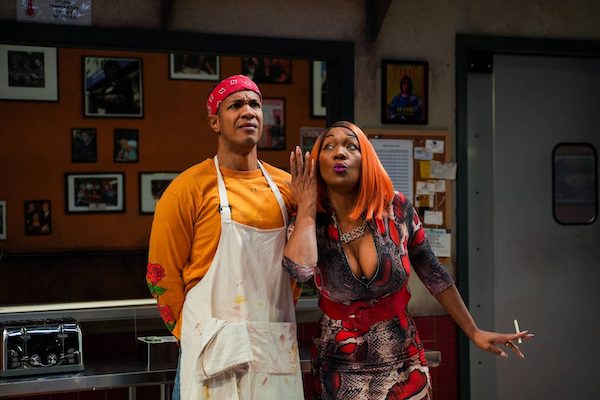
Wesley Guimarães and April Nixon in the Huntington Theatre’s production of Clyde’s. Photo: Muriel Steinke
The Huntington Theatre Company’s spunky-’n-sassy staging of Lynn Nottage’s “Clyde’s” gets my vote as the best play of 2023. It turns out that I am not alone: according to American Theatre magazine, HTC was one of 11 theaters nationally that pushed the play to the top of the most produced plays list during the 2022-2023 season. The local production featured a quirky and rambunctious ensemble cast. Over the course of 90 minutes, despite the playwright’s occasional heavy-handedness, comedy and pathos were served up in digestible, often hilarious, bites. In theater as in life, it’s all about timing. Clyde’s came along as audiences were cautiously emerging from the pandemic. With audiences gun shy about sitting in auditoriums next to (mostly unmasked) neighbors, Nottage’s comedy/drama became a way for them to leave their anxieties at the door and safely reenter the world of live performances.
The late composer/lyricist Stephen Sondheim once remarked that one of his favorite things about the theater took place after the final curtain: scampering to find a telephone booth (in the days before cellphones) and calling up a friend to excitedly share the news about a thrilling new production. I did not experience Sondheim’s rush. I saw shows that had the potential to transform and inspire, but none quite provided the necessary “wow” factor. One reason for the lack of panache: woebegone cries from theater folk about the need for cash. It’s a familiar cry, and not without merit. But how, in 2024, will theater companies get resources? I see a hopeful sign in the collaborative efforts among donors, audiences, and theater administrators. Clyde’s was a co-production between HTC and Berkeley Rep, a model that assures everyone sips from the same trickling revenue stream. And it was refreshing to see email announcements from theater publicists — who had previously reached out solely to their constituent audiences — urging their patrons to “see our friends’ productions” at other stages.
My hunch is that donors will pony up — if they have a say in what’s produced. We need less insider favorite cheerleadership and more leadership that dares to reach out to the community. We need dialogue, more audience forums, not more shows featuring artistic directors’ favorite playwrights.
Sarah Benson, departing artistic director of the risk-taking SoHo Rep in NYC, said it best in an exit interview in the New York Times:
Even in the mainstream commercial spaces, the old model of tourists and all of that, it’s gone, the subscription model is gone. There’s a lot of second-guessing that doesn’t put any trust in the audience — it’s really patronizing. But audiences want to see something new. They don’t want to see what they’ve seen over and over and over again.
Steve Elman
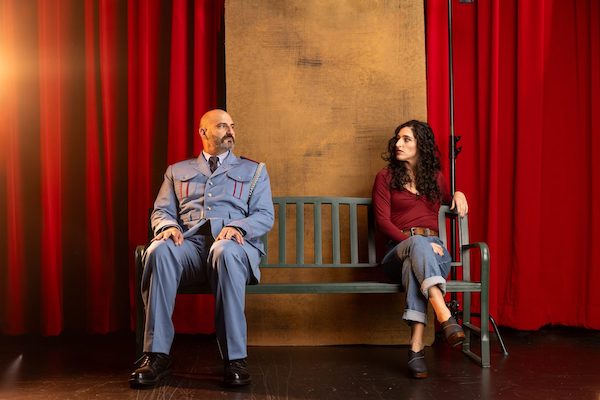
Brian Thomas Abraham and Jennifer Apple in The Band’s Visit, a co-production with SpeakEasy Stage. Photo: Nile Hawver
The Band’s Visit (David Yazbek / Itamar Moses) – Jennifer Apple, Brian Thomas Abraham, Jesse Garlick, Jared Troilo (dir.: Paul Daigneault) [Huntington / Speakeasy]
The first triumph for the Huntington’s new artistic director Loretta Greco, although she shares the glory with Paul Daigneault, director of this production and artistic director of the Speakeasy Stage Company, who co-produced this run with The Huntington. It was a letter-perfect performance of a musical drama that has great heart without ever being sentimental. Jennifer Apple was unforgettable in the lead role of Dina. If she outshone male lead Brian Thomas Abraham, that’s supposed to happen in this show. The character parts were strong throughout (as were the instrumental moments the actors had to undertake), but special mention has to be made of Jesse Garlick and Jared Troilo, who were delightful.
David Greenham
Artistically, there were high spots in theater this year, but mostly it was a joy to get back into auditoriums with impressive crowds and that organizations were operating at full speed.
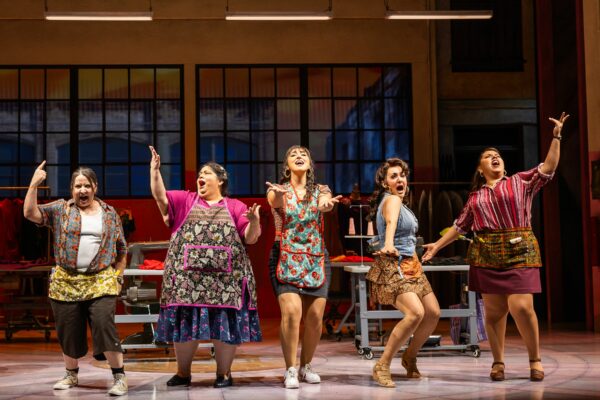
Sandra Valls (Prima Fulvia), Carla Jimenez (Pancha), Shelby Acosta (Prima Flaca), Jennifer Sánchez (Rosalí), and Florencia Cuenca (Estela) in the A.R.T. production of Real Women Have Curves: The Musical. Photo: Nile Hawver/Maggie Hall
The real hit of the season for me was the American Repertory Theatre’s current Real Women Have Curves. It’s “the full package,” with terrific performances, unified tech, fun music, and lots of heart. It’s playing through January 21. Go see it.
Most unsettling show of the year for me was Gloucester Stage’s production of Brenda Withers’s The Ding Dongs. The dramatist calls the play, which had received some development at the Wellfleet Actors’ Theater over a decade ago, her “favorite fever dream.” Under the guidance of Gloucester Stage’s new artistic director Rebecca Bradshaw, Nael Nacer, Karl Gregory, and Erica Steinhagen created a Twilight Zone trip about the current housing crunch that fit the real estate hysteria of our times.
If there was one driving theme evident throughout this year of theatergoing it was the embrace of diversity.
Like so many other organizations, local theaters raced to jump on the bandwagon of DEAI (diversity, equity, access, and inclusion) and LGBTQ+. It became customary for companies to publicly announce DEAI policies and land acknowledgments before their shows began. Soon came the arrival of nongendered rest rooms (which even our traditional audiences seem to shruggingly accept). In 2023 we started to see even more efforts to diversify stage productions — the selection of actors and artistic staff reflected a desire to amplify new artistic voices. Stories that were once ignored are now finding a place in theater seasons.
Central Square Theater kicked off their calendar year with Benjamin Benne’s Alma, a look back at December 2016, just before Donald Trump was inaugurated as, perhaps, the most underqualified President in our history. Undocumented, Alma (Karina Beleno Carney) lives in La Puente, California. She is well aware of the threat that lies ahead. “When they look at us, we remind them of a history they want to forget,” she tells her American-born 17-year-old daughter, Angel (Luz Lopez).
There’s a straight line to be drawn from this play to the A.R.T.’s current musical Real Women Have Curves, with music by Joy Huerta and Benjamin Velez, and a book by Lisa Loomer. The time is 1987 and about 20 miles west, in the Paredón Blanco neighborhood East Los Angels. The setting is the dress shop run by undocumented Estala Garcia (Florencia Cuenca). Her mother Carmen (Justina Machado) and the rest of the women who work in the shop are also under threat of deportation. Only Estala’s American-born sister Ana (Lucy Godinez) can fight the landlord and the system without fear of reprisal.
Up here in Maine, Dave Register and the Portland Theater Festival explored the issue of displacement with a walloping production of Martyna Majok’s Sanctuary City. In this play, it is months after 9/11 and we are in Newark, New Jersey, where high school students “B” (Shawn Denegre-Vaught) and “G” (Skye Figueroa) are grappling with the uncertain life of immigrant students.
LGBTQ+ stories on stage now pack a little more punch. Central Square Theater’s plucky but bumpy Rocky Horror Show took Richard O’Brien’s campy sci-fi silliness and gave it some unexpected bite by casting gender nonconforming individuals in nearly all the roles. It was an invigoratingly new way to look at well-known material, and that was fun.
We’re still in the early days of this expansion of subject matter. It’s great to see stories that come from California, New Jersey, and Transsexual Transylvania, but local theater will be even more challenging (and relevant) when these kind of narratives are inspired by people and events in Portland, Boston, and Providence. Still, all in all, 2023 was a notable start in the right direction.
Bill Marx
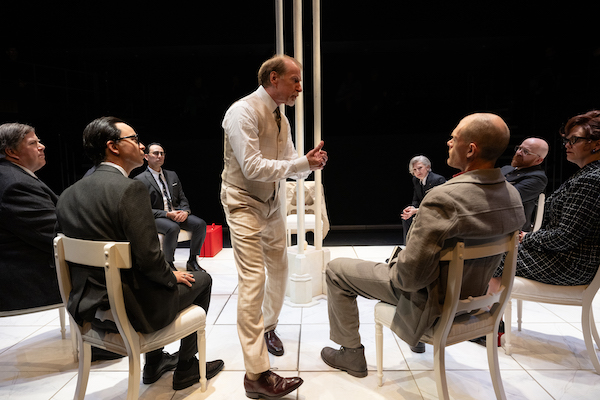
Tom Rooney as King Magnus with the cast members of The Apple Cart (Shaw Festival, 2023). Photo: David Cooper
I am already on record that Boston theater is becoming increasingly homogenized because it sets out to either feed Broadway and its environs or revive what had already been a hit (or at least blurb-worthy) in New York. Independence, artistic courage, and genuine engagement with the local community are rare. Case in point: In January, the Lyric Stage is producing Black dramatist Alice Childress’s Trouble in Mind after the play received a successful staging in New York. But Childress’s satire of Broadway has been around since the mid-’50s and many have recognized its theatrical merit. Why do it now? Why not a decade or two ago? The neglected script was just as pointed and scathing. Because the drama has just made a splash on Broadway. There are many compelling scripts by Black dramatists, among them the late Ed Bullins (who has a local connection) and Ishmael Reed, who is still kicking. But, unless a big New York player becomes interested, they won’t be produced here. Compounding the predictability: Covid has hamstrung (if not decimated) medium to small-sized theaters — those that are still around don’t feel that they can take chances. And if they don’t, who will?
Granted, one of my favorites of the past year was the regional audience favorite Fat Ham at the Huntington Theatre Company. Yes, the script delivered what has become an assembly line message, one that is designed to be ultra-safe. In the course of the evening, Black pain and repressed desire are transformed into a celebration of liberation and empowerment — once the villain du jour, the tyrannical patriarchy, has been dispatched. But the lively production, spiced up with plenty of the playwright’s humorous touches, did right by an update of Shakespeare’s Hamlet that mischievously relocated the tragic action to a barbecue tossed by a Black family living in a suburb of “Virginia, or Maryland, or Tennessee.”
As for my other picks, they had the merit of not being garlanded by New York huzzahs. Arlekin Players Theatre’s The Gaaga (The Hague) was a site-specific phantasmagoria written and directed by Sasha Denisova. Aside from this uneven but fierce black comedy, there has been nothing about Russia’s 2022 invasion of Ukraine on Boston’s stages. Nada. Our theater artists are indifferent to a horrific conflict that is, by many accounts, changing the world. Any bets that a local company will have the chutzpah to stage a drama about the current war in Gaza? (Sorry, revivals of Golda’s Balcony and Fiddler on the Roof don’t count.) To its credit, The Gaaga‘s acidic antics didn’t just lambast Russian barbarity: the play indicted a self-destructive status quo shaped by the dementia of the powerful for their own benefit, a point that resonates here and elsewhere around the world.
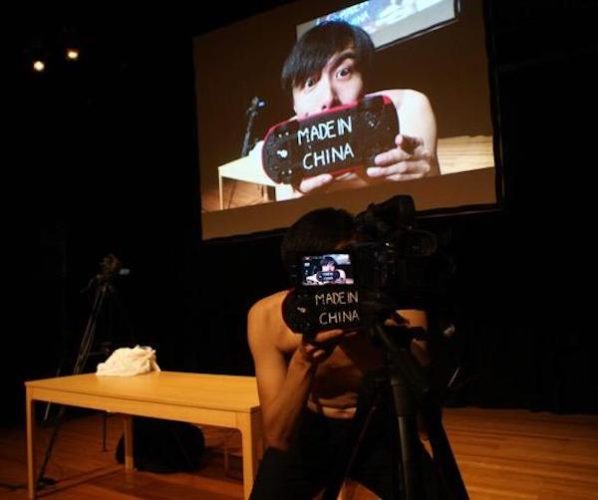
Wang Chong in Made in China 2.0. Photo: Mark Pritchard
Then there was the play that was too dangerous to review. Made in China 2.0, written and performed by Chinese dissident artist Wang Chong. Arts Emerson presented the world premiere of the show and it strongly suggested — though it did not require — that the press refrain from pointing out any elements in the piece critical of China “solely for the reason of Chong’s safety.” I did my best to evaluate what I could of Wang’s flawed autobiographical drama. Here is my final paragraph:
For me, Made in China 2.0 is valuable as an act of theatrical witnessing, the voice of a rebel who is facing considerable challenges from the powers that be. And, since the Arts Emerson guidelines don’t preclude addressing American theater, let’s place Made in China 2.0 — and its courageous writer-director — up against what is produced on Boston’s stages. We are told this is a time of crisis: the climate emergency, the war in Ukraine, the fragility of our democratic institutions. Apparently, our theaters believe this is overblown hand-wringing. Where is our political theater? Where is our experimental theater? Where are the plays that threaten the status quo to the point it flinches in pain? Has anyone here produced a drama that deals with the perfidy of global surveillance programs? It sounds like Wang did. Where are the dueling utopias and dystopias? Instead, it is business as usual, with all eyes turned to Broadway. What’s at stake there is financial success or failure: will the upcoming revival of Evita at the American Repertory Theater be boffo? Made in China 2.0 is a reminder that theater — in the hands of artists who want to do more than sell product or titillate tourists — is about taking risks. As I said, “a rebellious spirit” is a very dangerous thing — everywhere.
As I look over what appears to be the timid Boston theater season of 2024 (swap Gatsby for Evita), I stand by my challenge to business as usual. Hungering for something different than the same old, I headed up to Canada’s Shaw Festival for a fine staging of GBS’s 1929 comedy about democracy’s fault lines, The Apple Cart. Critic Fredric Jameson aptly wrote of Shaw that “in the uniquely apolitical atmosphere of Anglo-American literature … it is always instructive to examine the extraordinarily rich practice of one of the great political artists of modern times.” Not only to examine, but to experience — on stage — its zest, humor, nerve, verve, and dialectical panache.

At the Butterfly Conservatory. A Blue Morpho sits on my shoulder. Photo: Becky Hunt
An unexpected encounter reminded me of how exhilarating good theater can be. Particularly when it is free — in creative spirit, thought, and imagination — and invites audiences into an unpredictably playful collective experience, preferably inspirational or provocative. One of the largest glass-enclosed butterfly conservatories in North America is located near Niagara-on-the-Lake. Visitors are invited to take a self-guided tour through a humid, plant-filled area, walking through snaky paths swirling with 2,000 vibrantly colored butterflies. These gorgeous perpetual motion machines — capering en masse without rhyme or reason — swoop and flutter, sail and dive-bomb. The ever-darting dramatis personae changes, unpredictably, from moment to moment. The butterflies nest for a few fleeting moments on heads and arms, then fly off to rest on leaves or nosh on platforms filled with tidbits of food. It is a world ever-active and alive — spontaneity personified.
As for the worst production I saw in 2023, that would be Actors’ Shakespeare Project’s tepid Coriolanus. Shakespeare wrote in English, so why in the world stage a “new verse translation” by Sean San José? Defenders argue that this is the only way to keep the Bard viable on stage. If audiences have trouble with the language (as one director confessed to me, “There are too many words”) then replace the offending verbiage. Comfort is the name of the ticket-selling game, so let’s kick Shakespeare’s poetry to the curb. Some attending this “translation” no doubt begin to wonder what all the fuss is about. Could the Bard be overrated? Do we need to call for a rewrite? Poppycock. José’s dialogue sounded as pedestrian as the blather in your typical Netflix-ready screenplay. Let’s have no more of this …

